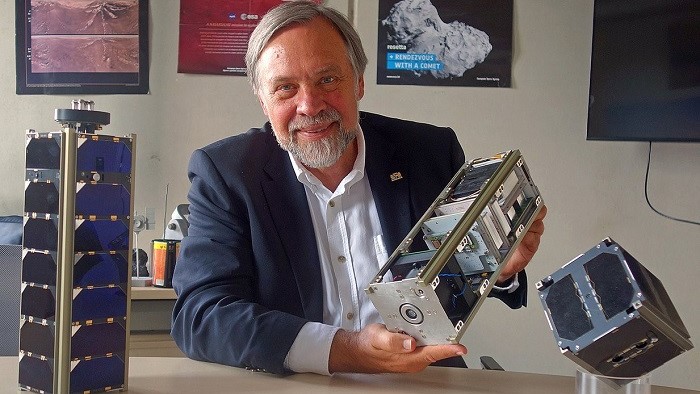Small satellites in space and in Würzburg
The advances in miniaturization technology enable the development of even smaller satellites that make up the majority of the satellites in orbit. Short construction times support rapid technology cycles and innovative applications. The computer science department at JMU Würzburg was able to contribute here: Together with numerous international students and other scientists Professor Schilling developed the 'University of Würzburg Experimental’ satellites (UWE). Step by step, numerous technological breakthroughs with the objective of “formation flight for small satellites” in orbit were achieved. In 2005, UWE-1 was the first German pico satellite with a mass of less than one kilogram. As the first of its kind, it has been exhibited at the Deutsches Museum in Munich since 2012.
Space education and research in Würzburg
The high number of international applicants for the European elite course "SpaceMaster - Master in Space Science and Technology" (2005-2018 with the support of the EU program Erasmus Mundus) led to the expansion of space technology in computer science at the University of Würzburg and to the international Elite Graduate Program "Satellite Technology". The theory in lectures is supplemented by relevant exercises, experiments and laboratory work. Here the students also contribute to the implementation of challenging small satellite projects.
Early recognized technology trends
In 17 years, the scientific basis for self-organizing satellite formations was step by step implemented, which led to the start of the demonstrator mission of the 4 NetSat small satellites on September 28, 2020. Current research on formations of interconnected satellites enables, for example, complex observations to be carried out jointly from complementary perspectives, changes in the orbit to avoid space debris or, at the end of the satellite’s service life, a controlled entry into the atmosphere with the goal of avoiding space debris. Formation technologies enable new applications: by example CloudCT by its ten small satellites uses computed tomography methods to characterize the interior of clouds, and thus enables better climate predictions.
Numerous awards for the small satellites from Würzburg
The students and graduates of the aerospace courses received numerous awards: VDE prizes, VDI prizes, faculty prizes, 1st prize in the Audi innovation competition, Rotary Culture Prize 2011, ZARM Prize 2006, IABG Prize 2008, young scientist group Werner von Siemens Foundation 2016 and 2019, Award of the British Interplanetary Society 2006, gold medal at graduate student contest IAC 2006, silver medal at IAC 2008, gold medal at IAC 2013, Leonardo-da-Vinci-Award 2016, Women in Aerospace Award 2017, Friedrich-Wilhelm-Bessel Award from the Alexander von Humboldt Foundation 2018. Schilling financed the development of the control and self-organization approaches with prestigious research awards from the European Research Council (ERC): in 2012 he received an ERC Advanced Grant for the advanced control approaches with NetSat, and in 2018 the most valuable European research award together with two Israeli colleagues, an ERC Synergy Grant for CloudCT (Cloud Tomography by Satellites for Better Climate Prediction). International trade associations such as IFAC, IEEE and IAF appointed him to their expert committees.
Text: Heidi Frankenberger, Elite Graduate Program "Satellite Technology"


